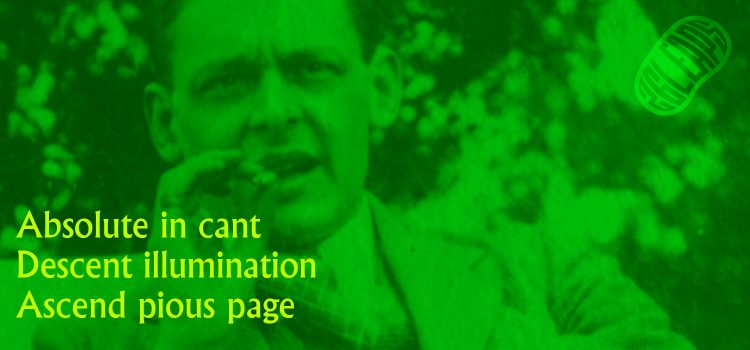
Rob Briggs
The Pope of Russell Square
Summer with the sea off Eastern Point
Burnt briar rose and bird life fell
Seeking solace from her granite caress and salt-kissed tolling bell
Idyllic waves call the drift of the sea
The rockpool silence between them
Some half-hidden flux of Ann’s ardour taut and seeking freedom
A canting age, an empty phrase
A hollowness at heart
Petty grotesques, malformations, divide us at the start
I yearn for St. Simeon Stylites or unoriginal sin
In society quite uncivilised
Characterised and thin
Contemplation of the sordid
The squalid and the slum makes
Repellent beauty necessary, negative and numb
Oh Absolute, come rescue me
From the fragrance of decay
From Circe and her sisters, from Adeleine at bay
Suffer me the unclean couplings
Of understated brutes
Permit me yet some failures in faith, some absurdity of suit
I’ve taken to the scavengers
Les maquereaux of lost
To decadence, drunkenness, the question and the cost
A monument to ether
Self-consciousness and hurt
Let us take decisions dear, contemplate, reverse
It may have been New England or Boston’s careless dream
Of my brown gods’ seasons and rages
At poetic lives unseen
Go gift me a moment’s surrender to
A sequence floundering in faith
Of God-intoxicated unknown saints, of spiritual malaise
So voyager, fare forward!
To Marburg, or Oxford instead
The past-putridity of ancient towns, reflected and unkempt
Tall, lean and hollow-cheeked
I cast off slim veneers
Seeking neighbourhoods of silence in London’s bitter years
So, how did I come to be here
Conversing on an air, reified and rarefied
The Pope of Russell Square?
Research story
Black Smoke, White Smoke: The Pope of Russell Square
Choosing a new pontiff is complex but clarity at the end is not.
Finding not one, but two intertwined leaps – one physical, one spiritual – took some fervent black smoke deliberation. For this, I am indebted to Lyndall Gordon’s evocative and essential biography ‘Eliot’s Early Years’.
The young Eliot enjoyed idyllic summers on the US East Coast. In 1896, his father built a family summer house at Cape Ann, but Eliot’s love of the sea was tempered by distaste for the smug, self-righteous inertia of Bostonian society.
He yearned for an ‘Absolute’ spiritual perfection – yet in turn sought out decadence in major cities. For example, in Paris, Eliot toured the Boulevard Sebastapol, studying prostitutes, drunkards and pimps (‘Les Maquereaux’).
He had a troubled relationship with women – evidenced in early verse and conservative family views. This includes his flirty relationship with Adeleine Moffat, a society lady who used to serve tea to Harvard undergraduates.
In 1914, Eliot moved to Marburg, Germany for a summer study course but the advent of war saw him on swiftly to Merton College, Oxford on a travelling scholarship. He found life in Oxford in 1914-15 quite dead, perhaps due to the war, and was seduced by London literary society and the company of Ezra Pound. Still in London, Eliot repeated his examinations of the underbelly of life in the disreputable suburbs of South London.
Eventually, he settled at Faber & Faber in 1924, converting to Anglo-Catholicism in 1927 – completing his leaps and cementing his long and fruitful association with Bloomsbury. The white smoke had risen.
